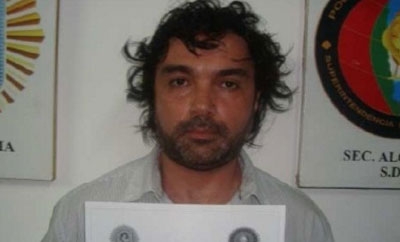The head of Colombian gang the Urabeños was arrested in Buenos Aires, drawing attention to Argentina’s status as a refuge for big-name Colombian traffickers, and raising the question of whether the capture will handicap the Urabeños’ expansion.
Henry de Jesus Lopez, alias “Mi Sangre,” was arrested in a Buenos Aires supermarket on October 30 in the company of his wife and 10 bodyguards, reports El Tiempo. He was a top leader of the Urabeños, a drug trafficking organization whose powerbase is along Colombia’s Caribbean coast. Mi Sangre was reportedly in charge of overseeing the Urabeños’ assault on Medellin, Colombia’s second-largest city, where the criminal group already controls many peripheral neighborhoods.
According to El Tiempo, Mi Sangre arrived in Argentina in 2010 and traveled frequently between Colombia, Ecuador, Venezuela, and Uruguay. He was in Buenos Aires posing as a Venezuelan businessman, and was reportedly applying for a visa to live in Ecuador.
El Tiempo reports that the gang leader was finally arrested thanks to intelligence from an informant, who will likely receive a $1.2 million reward. The newspaper also describes the sophisticated intelligence operations that tracked Mi Sangre’s movements in Buenos Aires, including a satellite device hidden in one of his cars.
Mi Sangre had a long criminal career. He started out in Medellin mafia organization the Oficina de Envigado, before joining paramilitary umbrella group the United Self-Defense Forces of Colombia (AUC), formally demobilized from the AUC in 2005. But like many other demobilized fighters he re-entered the criminal world, and joined the Urabeños’ operations in the Uraba region of northern Antioquia. His importance within the Urabeños hierarchy increased after the head of the group’s military wing, Juan de Dios Usuga, alias “Giovanni,” was killed in January 2012.
InSight Crime Analysis
The 41-year-old Mi Sangre was known in Colombia for his ability to evade capture and to survive in the criminal underworld even as many of his peers were arrested and killed. The fact that he was finally arrested abroad (there was no arrest warrant issued against him in Colombia until March 2012) is testimony to the kind of inter-agency, transnational cooperation needed to capture elusive drug capos. According to El Tiempo, Colombian judicial police the DIJIN, Argentine intelligence, the US Drug Enforcement Administration (DEA), and Interpol all participated in the intelligence operations that eventually resulted in Mi Sangre’s arrest.
The capture also calls attention to the number of high-profile Colombian criminals who have found refuge in the Argentine capital. A hitman who worked for Daniel “El Loco” Barrera was gunned down in Buenos Aires in April, and Barrera’s wife was also arrested in the city that month. According to El Tiempo, Mi Sangre was specifically ordered by Urabeños leader Dario Antonio Usuga, alias “Otoniel,” to leave Colombia for safety reasons, and use Argentina as his new hide-out. All this points to Argentina’s status as an area of rest and recuperation for Colombia drug traffickers looking to lie low.
The question now is whether Mi Sangre’s arrest will slow the expansion of the Urabeños. Virtually all of Colombia’s major drug trafficking groups have lost their heads of operations in the past two years: Barrera was arrested in September, the Rastrojos lost their military head and their top leader this year, and the Oficina de Envigado saw its commander (and his rival) fall. Mi Sangre’s capture is proof that the Urabeños are not immune.
All this is testament to the ability of Colombian authorities to track down and arrest the heads of criminal organizations. But while it is clear that Colombian law enforcement has mastered the “decapitation” approach, the challenge of dismantling criminal networks remains.

